- Home
- Colm Toibin
The Blackwater Lightship
The Blackwater Lightship Read online
Praise for The Blackwater Lightship
“The most perfect book on the [Booker] list. . . . The prose is economical and deft, and the book is rich with the entrancing stories the characters relate about themselves and others.”
—Paul Levy, The Wall Street Journal
“The Blackwater Lightship resurrects an innocence, and a corresponding excitement, about the liberating promise of bringing secrets to light. . . . In Tóibín’s Ireland, home is where the healing is.”
—Rand Richards Cooper, The New York Times Book Review
“Tóibín writes like a stylistic heir of Hemingway . . . a superb technician with a brave soul. The Blackwater Lightship is a great and humanizing novel.”
—Mark Levine, Men’s Journal
“ . . . infused with bouts of unexpected humor that make it as unpredictable as it is powerful. . . . In Tóibín’s hands, the strictures of the old and the allure of the new play off each other with invigorating dynamism.”
—Michael Upchurch, Chicago Tribune
“Tóibín writes with high-voltage restraint; his sentences are masterfully devoid of trickery . . . he is tuned in to the silent language of families, the messages that are unspoken and slip past the rest of the world, landing deep into the hearts of those who understand.”
—Robert Sullivan, Vogue
“A dynamic, many-tendriled drama . . . this masterfully intense tale of woe and redemption has much to say about the primal forces that shape us.”
—Kirkus Reviews (starred review)
“What makes The Blackwater Lightship seem so reassuring . . . [is] the steadiness of its fidelity to the ordinary world that reveals itself at those extraordinarily difficult moments that Colm Tóibín so deftly and sensitively describes.”
—Francine Prose, Elle
Thank you for downloading this Scribner eBook.
* * *
Join our mailing list and get updates on new releases, deals, bonus content and other great books from Scribner and Simon & Schuster.
CLICK HERE TO SIGN UP
or visit us online to sign up at
eBookNews.SimonandSchuster.com
FOR AIDAN DUNNE
ACKNOWLEDGMENTS
Yaddo, where some of this book was written.
ONE
Helen woke in the night to the sound of Manus whimpering. She lay still and listened, hoping that he would quieten and turn on his side and sleep, but when his voice became louder and more insistent and she could vaguely make out words, she got out of bed and moved towards the boys’ room; she was unsure whether he was dreaming or awake.
She had left the landing light switched on and she was able to see, as soon as she came into the room, that Cathal had his eyes wide open. He looked at her from the bed, an uninvolved spectator in the scene about to be enacted; he then looked over at his brother, who was crying out hoarsely and fending off some unknown terror with his arms. She woke Manus gently and pulled back the blanket which covered him. He was too hot. Only half awake and rubbing his eyes, he began to whimper again. It took him a while to realise that she was there and the dream was over.
‘I was frightened,’ he said.
‘You’re all right now. Maybe you’ll go back asleep.’
‘I don’t want to go back asleep,’ he said, and began to cry.
‘Will I carry you into our bed?’ she asked.
He nodded. He was motionless now, sobbing, waiting to be comforted. She knew that it would be better if she stayed with him and soothed him until he fell asleep again, but she lifted him and let him cling to her. Always, when she held him like this, he became quiet.
Cathal was still watching them.
Helen spoke to him across the room as though he were an adult. ‘I’m going to take Manus into our bed so that it will be easier for you to sleep,’ she said.
He pulled the blanket over himself and closed his eyes. At six, Cathal was clever enough to know that she was not carrying Manus into their bed for his sake, but because she was prepared to treat Manus like a baby. She wondered what Cathal thought about this, if he were hurt or disturbed – but he would be too proud to let her know, too ready to play the part of the grown-up big brother.
The half-light of dawn had broken through the landing window. She moved slowly into the bedroom. Hugh lay curled up sleeping, his arm across her side of the bed. She stood watching him, wondering at how easy it was for him to fall in and out of sleep. Manus stirred in her arms and turned to see why she had remained motionless in the room. He, too, watched his father sleeping and then turned away and huddled against her. Somewhere in the distance she could hear a car moving. She brought Manus over to the bed.
‘Will you sleep on my side?’ she whispered to him.
‘No, I want to be in the middle.’
‘You know what you want, don’t you?’ She smiled at him.
‘I want to be in the middle,’ he whispered.
She put him down with his back to Hugh and pulled the sheet over him. Some time in the night Hugh had pushed the duvet off the bed; she left it on the floor, it would be too hot now with the three of them in the bed. She rested her head on the pillow, relieved that Manus was lying quietly between them and trying to reassure herself that Cathal had fallen back asleep in the other room.
They had gone to bed early when there was still vague light in the sky and made love and she was filled now with a tenderness for Hugh and a wish, something which had become a joke between them, that she could be more like him, even-tempered, easy to please – easy to please? he had laughed when she said that – with nothing secret, nothing held inside.
As Manus edged towards sleep he began to pull at her, he wanted her full attention. He did not want her to turn her back on him. ‘Come around this way,’ he whispered.
She looked at the clock. It was only a quarter to five. Suddenly, she was cold. She reached to the floor, found the duvet, pulled it on to the bed and arranged it over them. They would need to be warm for a while.
When Helen woke again, Hugh and Manus were sound asleep. It was just after eight o’clock; the room was hot. She slipped out of the bed and, carrying her dressinggown and slippers, she went downstairs, where she found Cathal, still in his pyjamas, watching television, the zapper in his hand.
‘I’ve finished in the bathroom if you want to have a shower,’ she said to him. He nodded and stood up.
‘Are they still asleep?’ he asked.
‘They are,’ she said and smiled.
‘I’d better go before they wake up,’ he said.
This was their secret language; they mimicked adults, they spoke to one another like a married couple. Cathal hated instructions or orders or being spoken to like a child. If she had told him to go to the bathroom, he would have dawdled and delayed. When Manus is his age, she thought, I will have to carry him to the bathroom.
They were the first to live in this house, and the first in their estate to build an extension – a large, square, bright room which served as kitchen and dining-room and playroom. Hugh had wanted the house for the beech tree which, through some miracle, had been left in their back garden, and the park behind the house. She had liked only the newness, the idea that no one had ever lived here before.
She washed up from the night before and noticed from the kitchen window a breeze flit through the leaves of the beech tree and the fir trees at the edge of the park, and then a sudden darkening in the air, a sense of rain. She turned on the radio – Hugh, as usual, had it tuned to Raidio na Gaeltachta – and found Radio One just as the pips sounded for the nine o’clock news. She would be able to listen to the weather forecast.
As she and Cathal were having breakfast, Cathal engrossed in a comic, the shouting and
laughing began upstairs. Manus was squealing at the top of his voice.
‘Listen to them,’ she said. ‘It’s hard to know which of them is the bigger baby.’
Cathal smiled at her and took a slice of toast and went back to his comic. They ate in silence as the noise upstairs continued, Hugh shouting something in Irish at Manus, and then both of them shouting at the same time until one of them – she presumed it was Manus – landed on the floor with a thud.
Soon, they both appeared, Hugh in his dressing-gown carrying Manus, still wearing his pyjamas.
‘I fell out of bed,’ he said.
‘We know, we heard you,’ Helen said.
His cheeks were flushed. He began to squeeze Hugh’s nose.
‘Stop that. Sit down and have your breakfast.’
As soon as Manus was seated, he saw Cathal’s comic and reached across the table and grabbed it. Cathal tried to hold on to it, but Manus was too quick for him.
‘Give it back.’ Helen said to him.
‘He’s finished with it,’ Manus said.
‘Give it back and say you’re sorry.’
He looked at her, calculating what the chances were of her losing her temper. He laughed. ‘Don’t be silly,’ he said.
‘We’re all waiting here. No one is moving until you hand it back and say you’re sorry,’ she said.
Cathal sat with his hands by his sides, content to be the injured party. Manus looked at Helen and then at Hugh, who spoke gruffly to him in Irish. Manus sighed and handed the comic back to Cathal.
‘And say I’m sorry,’ Helen said.
‘I’m sorry.’
‘And I won’t do it again.’
‘And I won’t do it again.’
‘You’re becoming a bit of a monster,’ she said to him and turned to the sink.
‘You’re becoming a bit of a monster,’ he repeated.
She looked out at the garden and wondered how she should respond; she was grateful when she heard Hugh saying something to him. It was, she thought, her own fault for calling him a bit of a monster. She would leave it, forget about it, feed him his breakfast. He hated being smaller and younger than Cathal. What age would they be, he had asked her, when they would both be the same size? Would it be long? Cathal never hit him or bullied him, but he was always aware that he was at an advantage. Even though Cathal was only two when Manus was born, he had immediately seized on his new role – the one who didn’t cry, who didn’t have a dirty nappy, who didn’t want to be brought into his parents’ bed, who didn’t grab comics from his brother, who didn’t give back-answers to his mother.
When she had given Manus his cornflakes and cold milk and left Hugh to fend for himself – Hugh was more at home in the kitchen than she was – she went out to the line to hang a few dishcloths she had washed. She made a note in her head to find out if there was a good book about bringing up boys, which might make things easier to handle. Once again, as she stood there, the sky darkened. She walked down to the bottom of the garden to take in a deckchair which Hugh must have left out overnight.
She remembered once, perhaps a year earlier, when her brother was in the house and witnessed the boys going to bed. Hugh was in charge and both Cathal and Manus, but especially Manus, did everything to be allowed to stay up, such as clinging to their mother and refusing to do anything their father said. When the house was all quiet and the boys fast asleep, Declan said it was proof, if they needed proof, that boys wanted to sleep with their mother and kill their father.
‘They just wanted to stay up late,’ Hugh said. ‘It just happened that I was in charge.’
‘Did you want to sleep with your mother and kill your father?’ Helen asked Declan.
‘No, no,’ he laughed, ‘gay boys want the opposite, or at least eventually they do.’
‘Sleep with your father?’ Hugh asked. His tone was earnest, dead serious.
‘Yeah, and have a baby, Hugh,’ Declan said drily.
‘I still want to kill my mother,’ Helen said. ‘Not every day, but most days. I cannot imagine anyone wanting to sleep with her.’
She had not forgotten the exchange: Hugh’s uneasiness, his innocence, his attempts to suggest to her when Declan had left that talking about killing your parents, or sleeping with them, even in jest, was a sort of blasphemy. She was careful not to seem too impatient with him, aware that she and Declan could without any effort join forces and make Hugh feel that they were laughing at him. Maybe that is what brothers are for, she thought as she walked back into the kitchen, perhaps even now Cathal and Manus are involved in unspoken conspiracies.
‘The forecast is for showers,’ she said to Hugh, ‘and I’ve worked it out. If it rains, all the tables will fit in here and in the front room and we can put all the drinks in the hall. But we don’t have to decide until later.’
It was the end of June, Hugh’s end of term; the next morning he would take the boys to Donegal. Tonight, he had invited the teachers from his all-Irish school to celebrate the school’s first year in existence, and other friends – musicians, Irish-speakers. Helen had made him invite all the neighbours, including the Indian doctor and his wife and their children who lived at the top of the road.
‘No one can complain about the noise if they’ve just been fed in the house,’ she said.
‘Half of them looked at me like I was collecting taxes. I bet that guard in the corner house is from Offaly. He has a big, thick accent.’
‘Who is that friend of yours who sings “The Rocks of Bawn”? The guard’ll have a big, thick accent when he hears him.’
‘Mick Joyce. He’s loud, all right. Is your brother coming?’
‘I haven’t asked him,’ she said. ‘He wouldn’t mix. I don’t think he likes “The Rocks of Bawn”.’
‘Has he fallen out with us?’
‘He’s busy. He’s doing research full-time.’
‘He has plenty of time so.’ Hugh laughed.
‘My mother says he’s in the laboratory day and night.’
‘Is your mother coming?’ he laughed.
‘Imagine what she’d say about wasting all this money!’
‘She’d be great on the door, though,’ Hugh said.
Hugh spoke Irish to the boys, to his mother and his brothers and sisters, and to at least half of his friends. He insisted that Helen understood more than she pretended to understand, but it was not true. She found his Donegal accent in Irish too difficult, and she made out very little of what he said. Tonight, she knew, she would be irritated by the two or three who would continue to speak to her in Irish, indifferent to the fact that she could not follow, but it was an irritation which would fade easily.
There would be no friends of hers at the party, nobody from the comprehensive school of which she was principal – she was still the youngest principal in the country – nobody from home, nobody from her schooldays or college days. She had one or two women she knew and liked and saw sometimes, but no close friends.
She had given up a long-cherished belief that she was self-contained, or happiest when alone. She could still shut her eyes and bite her lip at how unexpected it was, this life she had made. Nonetheless, she wanted three or four, maybe more, days alone here now after the party, to sit in the garden or an old armchair in the kitchen and read the novels she had saved in the winter, and do nothing else except go to a meeting in the Department of Education, interview prospective teachers and move around the house knowing that, unless there was an emergency, no one would call her or want her immediate attention. But it was important for her to know too that Hugh and the boys were just away for a short while, she would see them soon.
Tomorrow morning, then, Hugh would take the boys to Donegal in the car and she would follow in a while, catch the train to Sligo or the bus to Donegal town, and even now she could imagine Hugh there to meet her, recognising when he saw her how much she feared her own passionate attachment to him, how much she would hold back for a while. After a lot of difficulty, he had learned, as m
uch as he could, to trust her, even though she knew it was hard sometimes.
When the janitor from Hugh’s school, Frank Mulvey, and his son came in a van with the tables and chairs, she had to restrain herself from telling them where to put everything; she wondered, as she watched them, at how blindly they moved, planning nothing, moving forward without direction. She smiled at herself minding so much about this.
She decided to go to the supermarket to buy the food and the beer. Hugh had already collected the wine and the glasses. She watched from the kitchen window as the boys played aeroplanes in the back garden, circling each other, dipping and diving, their arms outstretched as wings. She called Manus and when he ignored her she called again. He moved reluctantly towards her.
‘I want you to come with me to the supermarket,’ she said.
‘Is Cathal going?’
‘No, just you.’
‘Why just me? Why can’t Cathal go?’
‘Come on quickly,’ she said.
‘I don’t want to go,’ he said.
‘Come on, wash your hands, we’re in a hurry.’
‘I don’t want to go.’
By this time, Cathal had approached and was observing them both.
‘Cathal is going to help your daddy with the tables and chairs,’ she said.
‘I want to do that,’ Manus said.
‘Manus, you’re coming with me,’ she said.
He placed himself in the back of the car so that he could see her face in the rear-view mirror.
‘But why am I going with you?’ he asked.
‘Do you think you need to get your hair cut before you go to Donegal?’ She would have said anything to distract him as she set off for the supermarket.
‘I’m not getting my hair cut,’ he said.
‘No, you decide. I just asked you.’
‘Cathal isn’t getting his hair cut.’
‘It’s up to you. You’re old enough to decide yourself.’
This was the plan, this was why she had made him come with her; she had thought about it as she lay awake in the night: she would have to stop treating him like a baby, she would have to begin to talk to him as though he were an adult. But it was having the opposite effect.

 The Magician
The Magician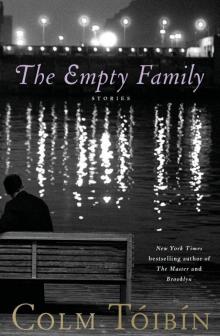 The Empty Family (v5)
The Empty Family (v5)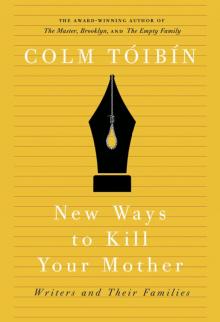 New Ways to Kill Your Mother
New Ways to Kill Your Mother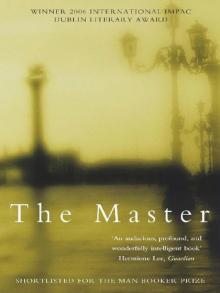 The Master
The Master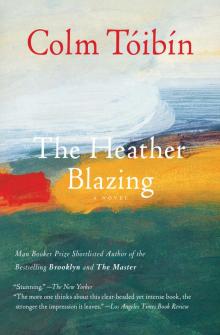 The Heather Blazing
The Heather Blazing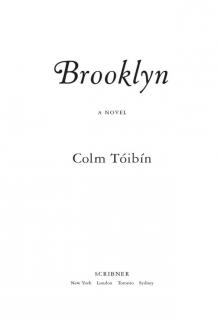 Brooklyn
Brooklyn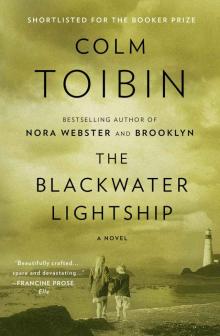 The Blackwater Lightship
The Blackwater Lightship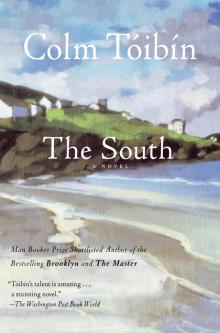 The South
The South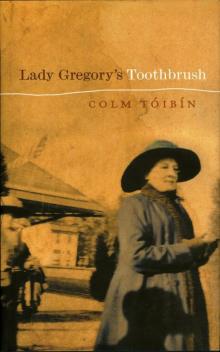 Lady Gregory's Toothbrush
Lady Gregory's Toothbrush House of Names
House of Names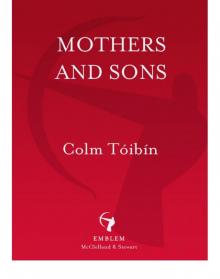 Mothers and Sons
Mothers and Sons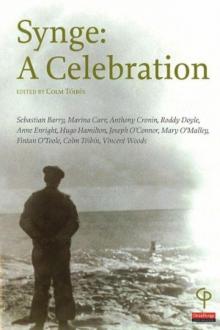 Synge
Synge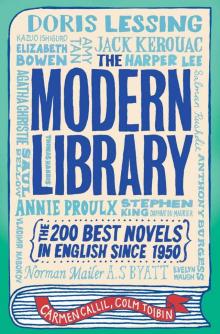 The Modern Library
The Modern Library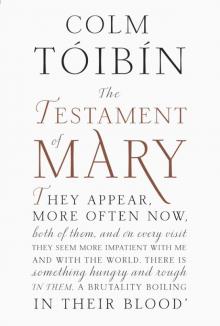 The Testament of Mary
The Testament of Mary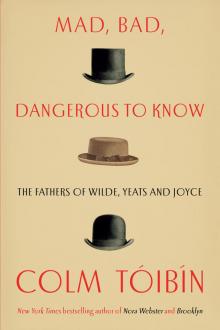 Mad, Bad, Dangerous to Know
Mad, Bad, Dangerous to Know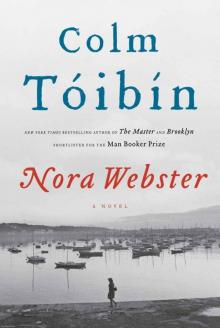 Nora Webster: A Novel
Nora Webster: A Novel